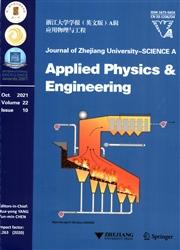岩石溶蚀模拟及其在地球工程中的应用
IF 3.9
3区 工程技术
Q1 ENGINEERING, MULTIDISCIPLINARY
引用次数: 1
摘要
目的 展示一种用于描述溶解过程及其与岩土工程的耦合的方法, 预测地下洞穴的发育过程, 为天坑等地质灾害的防治提供依据 创新点 用达西尺度模型的扩散界面代替孔隙尺度模型的锐利界面来描述溶解过程, 提升研究对象的尺度和计算效率。 方法 利用体积平均法将孔隙尺度模型上推到达西尺度。 结论 达西尺度模型描述溶解过程与孔隙尺度模型的结果吻合良好, 可广泛应用于岩土工程中的各类溶解问题。 The subsoil contains many evaporites such as limestone, gypsum, and salt. Such rocks are very sensitive to water. The deposit of evaporites raises questions because of their dissolution with time and the mechanical-geotechnical impact on the neighboring zone. Depending on the configuration of the site and the location of the rocks, the dissolution can lead to surface subsidence and, for instance, the formation of sinkholes and landslides. In this study, we present an approach that describes the dissolution process and its coupling with geotechnical engineering. In the first part we set the physico-mathematical framework, the hypothesis, and the limitations in which the dissolution process is stated. The physical interface between the fluid and the rock (porous) is represented by a diffuse interface of finite thickness. We briefly describe, in the framework of porous media, the steps needed to upscale the microscopic-scale (pore-scale) model to the macroscopic scale (Darcy scale). Although the constructed method has a large range of application, we will restrict it to saline and gypsum rocks. The second part is mainly devoted to the geotechnical consequences of the dissolution of gypsum material. We then analyze the effect of dissolution in the vicinity of a soil dam or slope and the partial dissolution of a gypsum pillar by a thin layer of water. These theoretical examples show the relevance and the potential of the approach in the general framework of geoengineering problems.本文章由计算机程序翻译,如有差异,请以英文原文为准。
Modelling and applications of dissolution of rocks in geoengineering
目的 展示一种用于描述溶解过程及其与岩土工程的耦合的方法, 预测地下洞穴的发育过程, 为天坑等地质灾害的防治提供依据 创新点 用达西尺度模型的扩散界面代替孔隙尺度模型的锐利界面来描述溶解过程, 提升研究对象的尺度和计算效率。 方法 利用体积平均法将孔隙尺度模型上推到达西尺度。 结论 达西尺度模型描述溶解过程与孔隙尺度模型的结果吻合良好, 可广泛应用于岩土工程中的各类溶解问题。 The subsoil contains many evaporites such as limestone, gypsum, and salt. Such rocks are very sensitive to water. The deposit of evaporites raises questions because of their dissolution with time and the mechanical-geotechnical impact on the neighboring zone. Depending on the configuration of the site and the location of the rocks, the dissolution can lead to surface subsidence and, for instance, the formation of sinkholes and landslides. In this study, we present an approach that describes the dissolution process and its coupling with geotechnical engineering. In the first part we set the physico-mathematical framework, the hypothesis, and the limitations in which the dissolution process is stated. The physical interface between the fluid and the rock (porous) is represented by a diffuse interface of finite thickness. We briefly describe, in the framework of porous media, the steps needed to upscale the microscopic-scale (pore-scale) model to the macroscopic scale (Darcy scale). Although the constructed method has a large range of application, we will restrict it to saline and gypsum rocks. The second part is mainly devoted to the geotechnical consequences of the dissolution of gypsum material. We then analyze the effect of dissolution in the vicinity of a soil dam or slope and the partial dissolution of a gypsum pillar by a thin layer of water. These theoretical examples show the relevance and the potential of the approach in the general framework of geoengineering problems.
求助全文
通过发布文献求助,成功后即可免费获取论文全文。
去求助
来源期刊

Journal of Zhejiang University-SCIENCE A
工程技术-工程:综合
CiteScore
5.60
自引率
12.50%
发文量
2964
审稿时长
2.9 months
期刊介绍:
Journal of Zhejiang University SCIENCE A covers research in Applied Physics, Mechanical and Civil Engineering, Environmental Science and Energy, Materials Science and Chemical Engineering, etc.
 求助内容:
求助内容: 应助结果提醒方式:
应助结果提醒方式:


